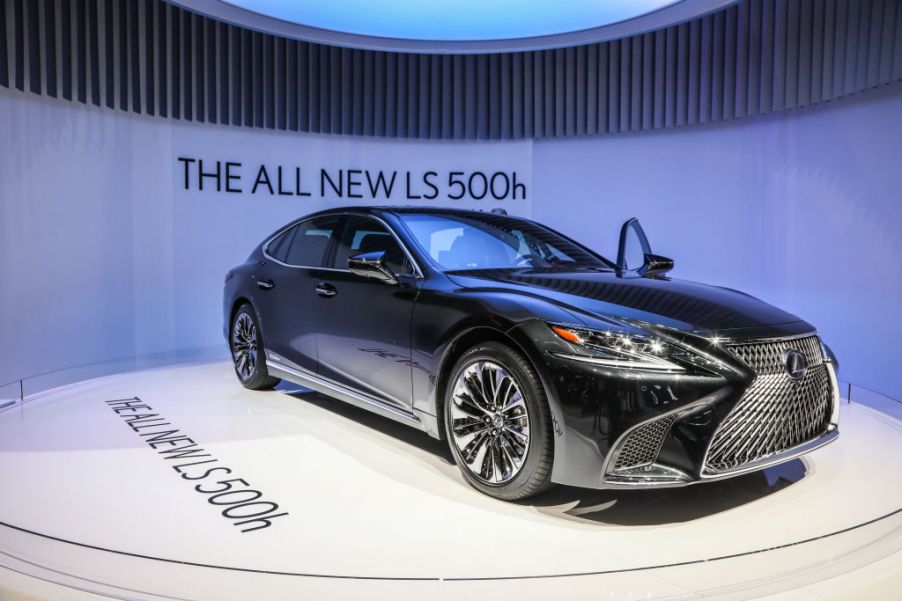
The 2020 Lexus LS500h Is a Waste of $100K
For years, the Lexus LS reigned supreme with its robust engine, smooth ride, and posh interior. For buyers who want better fuel economy from their luxury sedan, Lexus offers a hybrid version, the LS500h. Does this model provide both the performance and the improved gas mileage that makes it worth the significantly higher price tag?
CarandDriver.com explores whether the Lexus LS500h is worth the money, and we come along for the ride.
A big-ticket luxury hybrid sedan
It would seem logical that Lexus would use the LS500’s standard 416-hp twin-turbo V6 and mate it to an electric motor to power the LS500h. Instead, the automaker reinvents the wheel and equips this luxury hybrid with an Atkinson-cycle V6 that makes just 295 hp.
This engine is more efficient than a conventional engine, and Lexus has thrown in two motor-generators for good measure. Still, the total output for the LS500h is a mere 354 hp.
As a result, the hybrid version is over 300 pounds heavier and a half-second slower in the 0-to-60-mph heat. Lexus’ engine choice seems counterintuitive compared to other automakers. For example, the Volvo S90 T8’s supercharged four-cylinder engine makes 400 hp. Or, there’s the Mercedes-Benz S560e’s 3.0-liter V6 that churns out 469 hp.
Better fuel economy should be a no-brainer for a hybrid sedan, even a full-size luxury one. But the Lexus LS500h AWD model wrings out only 31 mpg— just 1 mpg more than the standard rear-wheel-drive LS500. The biggest advantage of this underperforming hybrid is that it has a solid range of 510 miles city and 688 miles highway.
But when it comes down to it, adding an “h” to the LS500 adds $4,650 to the standard LS500’s starting price of $76,475 and not too much more. What happens when C&D ups the ante and tests the much more expensive AWD version of this Lexus hybrid?
All-wheel drive makes the LS500h pricier, but not much better
Car and Driver testers were looking for the polished performance that the Lexus LS has built its reputation on for the last three decades. Unfortunately, the testers didn’t find it in the LS500h.
Toyota’s hybrid systems that used a continuously variable automatic transmission (CVT). Lexus took a different tack and attached a four-speed automatic transmission to the back of the CVT. Then it engineered a way to get the two gearboxes to work in concert so that it mimics a 10-speed automatic transmission.
The Lexus LS500h’s multi-stage hybrid system is efficient and it plays nicely under full throttle. But C&D’s testers describe the LS500h’s V6 kicking in during braking on a downhill stretch. In a situation like this, a hybrid’s regenerative braking should be functioning and accumulating energy.
Testers tried to pull the LS500h out of gas engine mode by pressing the EV mode button but to no avail. The car simply sent back a message that the EV mode wasn’t available.
Besides this Lexus’ clumsy powertrain, its lithium-ion battery pack is limited to a paltry 1.1 kWh capacity. If we compare this capacity to the battery pack of the much lighter Nissan Leaf‘s 30 kWh, it’s pretty meager. C&D notes that this amount of power on its own would only yield a few miles for a car with a curb weight of 5,100 pounds.
Is the higher price worth it?
It’s fun to speculate—as the testers at Car and Driver did—about the Lexus LS500h’s electric motors matched with the LS500’s twin-turbo V6. The horsepower produced by this combination would be around 475 hp and yield a 0-to-60 mph time of under 5.0 seconds. The fuel economy in this scenario might even be improved. And then maybe the LS500h would finally be up to par with other hybrid luxury sedans.
But $98,935 is too steep a price to the all-wheel-drive version of the 2020 Lexus LS500h with its efficient yet inconsistent powertrain. It costs almost $30,000 more but offers much less power and less-than-impressive fuel economy than the base LS500. If buyers want performance in an electric luxury sedan, why would they choose this EV and not the lightning-fast Tesla Model S for thousands of dollars less? The choice is obvious.


